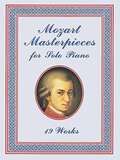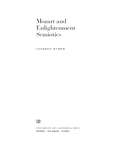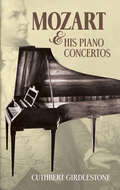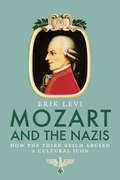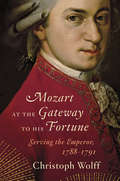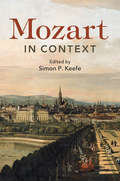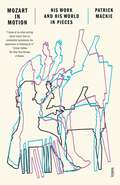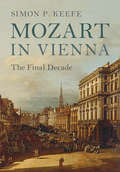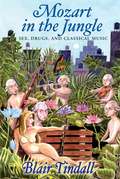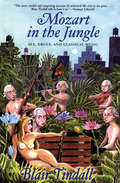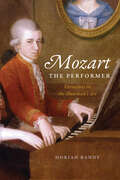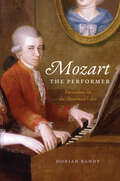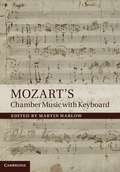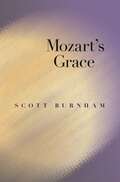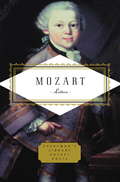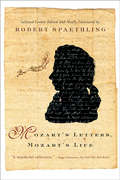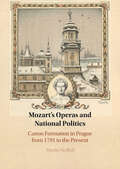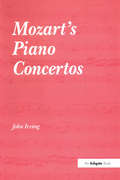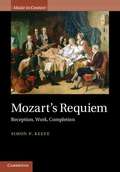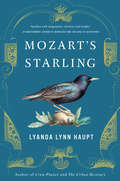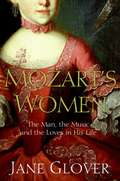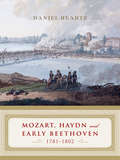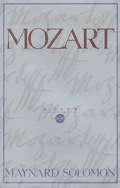- Table View
- List View
Mozart Masterpieces: 19 Works for Solo Piano (Dover Classical Piano Music)
by Wolfgang Amadeus MozartA superb assortment of the composer's best piano pieces includes sonatas, fantasies, variations, rondos, minuets, and more. Highlights include such engaging works as "Turkish Rondo," "Sonata in C," and a dozen variations on "Ah, vous dirai-je, Maman" (better known as "Twinkle, Twinkle, Little Star"). Reprinted from authoritative sources, the collection combines a magnificent selection of pieces in one convenient, attractive, inexpensive volume.
Mozart Studies 2
by Simon P. KeefeCultural, historical and reception-related contexts are central to understanding Mozart, one of the greatest and most famous musicians of all time. Widening and refining the lens through which the composer is viewed, the essays in Mozart Studies 2 focus on themes, issues, works and repertories perennially popular among Mozart scholars of all kinds, pointing to areas primed for future study and also suitable for investigation by musicians outside the scholarly community. Following on from the first Mozart Studies volume, internationally renowned contributors bring new perspectives to bear on many of Mozart's most popular works, as well as the composer's letters, biography, and reception. Chapters are grouped according to topics covered and collectively affirm the vitality of Mozart scholarship and the significant role it continues to play in defining and redefining musicological priorities in general.
Mozart Violin Sonatas (Complete Mozart Edition)
by Alec Hyatt King Jean-Victor Hocquard Uwe Jüttner Carlo VitaliThis is the text of the 82-page Compact Disc booklet which accompanies the Mozart Violin Sonatas volume of the Philips Complete Mozart Edition. It begins with a complete table of contents listing all the sonatas and tracks and is followed by essays in English, German, French and Italian discussing the works. The essay in English, German, and Italian is authored by Alec Hyatt King. The essay in French is by Jean-Victor Hocquard. The booklet is appropriately indexed for DAISY navigation. This lovely music is available on disc from many artists and is also available on Apple Music, YouTube, Spotify, and other digital music services. Whether you are a CD collector, a listener on a digital service or a performer, this booklet will help you gain a greater understanding and appreciation of this music.
Mozart and Enlightenment Semiotics
by Stephen RumphIn this groundbreaking, historically-informed semiotic study of late eighteenth-century music, Stephen Rumph focuses on Mozart to explore musical meaning within the context of Enlightenment sign and language theory. Illuminating his discussion with French, British, German, and Italian writings on signs and language, Rumph analyzes movements from Mozart's symphonies, concertos, operas, and church music. He argues that Mozartian semiosis is best understood within the empiricist tradition of Condillac, Vico, Herder, or Adam Smith, which emphasized the constitutive role of signs within human cognition. Recognizing that the rationalist model of neoclassical rhetoric has guided much recent work on Mozart and his contemporaries, Rumph demonstrates how the dialogic tension between opposing paradigms enabled the composer to negotiate contradictions within Enlightenment thought.
Mozart and His Piano Concertos (Dover Books On Music: Composers)
by Cuthbert Girdlestone Sara Davis BuechnerThis classic of music criticism provides detailed studies of 23 of Mozart's piano concertos. In addition to establishing the lines along which the genre developed, the concertos also shed light upon the technical and inspirational growth of their creator. The first full-length survey devoted to these works, this scholarly book presents a full, concrete musical analysis that makes liberal use of musical examples -- 417 in all -- and presents authoritative information on the concertos' form, tone, style, and balance as well as the circumstances of their composition. The author compares and contrasts each piece with Mozart's other works and with compositions by Beethoven, Haydn, and other composers. A definite text for musicologists, performers, teachers, and students, this study's clarity and personable tone make it accessible to any lover of Mozart's music.
Mozart and the Nazis: How the Third Reich Abused a Cultural Icon
by Erik LeviA music historian uncovers Nazi Germany&’s use of Mozart as a WWII propaganda tool in this &“intriguing study [that] comprehends a range of vital topics&” (Choice). As the Nazi war machine expanded its bloody ambitions across Europe, the Third Reich sought to promote a sophisticated and even humanitarian image of German culture through the tireless promotion of Mozart&’s music. In this revelatory book, Erik Levi draws on World War II era articles, diaries, speeches, and other archival materials to provide a new understanding of how the Nazis shamelessly manipulated Mozart for their own political advantage. Mozart and the Nazis also explores the continued Jewish veneration of the composer during this period while also highlighting some of the disturbing legacies that resulted from the Nazi appropriation of his work. Enhanced by rare contemporary illustrations, Mozart and the Nazis is a fascinating addition to the study of music history, World War II propaganda, and twentieth century politics.
Mozart at the Gateway to His Fortune: Serving the Emperor, 1788-1791
by Christoph WolffASCAP-Deems Taylor Award winner A fresh look at the life of Mozart during his imperial years by one of the world's leading Mozart scholars. "I now stand at the gateway to my fortune," Mozart wrote in a letter of 1790. He had entered into the service of Emperor Joseph II of Austria two years earlier as Imperial-Royal Chamber Composer--a salaried appointment with a distinguished title and few obligations. His extraordinary subsequent output, beginning with the three final great symphonies from the summer of 1788, invites a reassessment of this entire period of his life. Readers will gain a new appreciation and understanding of the composer's works from that time without the usual emphasis on his imminent death. The author discusses the major biographical and musical implications of the royal appointment and explores Mozart's "imperial style" on the basis of his major compositions--keyboard,chamber, orchestral, operatic, and sacred--and focuses on the large, unfamiliar works he left incomplete. This new perspective points to an energetic, fresh beginning for the composer and a promising creative and financial future.
Mozart in Context (Composers in Context)
by Simon KeefeThe vibrant intellectual, social and political climate of mid eighteenth-century Europe presented opportunities and challenges for artists and musicians alike. This book focuses on Mozart the man and musician as he responds to different aspects of that world. It reveals his views on music, aesthetics and other matters; on places in Austria and across Europe that shaped his life; on career contexts and environments, including patronage, activities as an impresario, publishing, theatrical culture and financial matters; on engagement with performers and performance, focusing on Mozart's experiences as a practicing musician; and on reception and legacy from his own time through to the present day. Probing diverse Mozartian contexts in a variety of ways, the contributors reflect the vitality of existing scholarship and point towards areas primed for further study. This volume is essential reading for students and scholars of late eighteenth-century music and for Mozart aficionados and music lovers in general.
Mozart in Motion: His Work and His World in Pieces
by Patrick MackieIn exhilarating, transformative prose, the poet Patrick Mackie reveals a musician in dialogue with culture at its most sweepingly progressive.Mozart is one of the most familiar and beloved icons of our culture, but how much do we really understand about his music, and what can it reveal to us about the great composer?Following Mozart from his youth in Salzburg to his early death, from his close and rivalrous relationship with his father to his romantic attachments, from his hugely successful operas to intimate compositions on the keyboard, Patrick Mackie leads the reader through the major and lesser-known moments of the composer’s life and brings alive the teeming, swiveling modernity of eighteenth-century Europe. In this era of rococo painting, surrealist aesthetics, and political turbulence, Mozart reckoned with a searing talent that threatened to overwhelm him, all the while pushing himself to extraordinary feats of musicianship.In Mozart in Motion, we are returned to the volatility of the eighteenth century and hear Mozart’s music in all its audacious vividness, gaining fresh perspectives on why his works still move us so intensely today as we continue to search for a modernity he imagined into being.
Mozart in Vienna: The Final Decade
by Keefe Simon P.Mozart's greatest works were written in Vienna in the decade before his death (1781-1791). This biography focuses on Mozart's dual roles as a performer and composer and reveals how his compositional processes are affected by performance-related concerns. It traces consistencies and changes in Mozart's professional persona and his modus operandi and sheds light on other prominent musicians, audience expectations, publishing, and concert and dramatic practices and traditions. Giving particular prominence to primary sources, Simon P. Keefe offers new biographical and critical perspectives on the man and his music, highlighting his extraordinary ability to engage with the competing demands of singers and instrumentalists, publishing and public performance, and concerts and dramatic productions in the course of a hectic, diverse and financially uncertain freelance career. This comprehensive and accessible volume is essential for Mozart lovers and scholars alike, exploring his Viennese masterpieces and the people and environments that shaped them.
Mozart in the Jungle: Sex, Drugs and Classical Music
by Blair TindallA candid and unsparing account of orchestral life
Mozart in the Jungle: Sex, Drugs, and Classical Music
by Blair TindallThe memoir that inspired the two-time Golden Globe Award–winning comedy series: “Funny . . . heartbreaking . . . [and] utterly absorbing” (Lee Smith, New York Times–bestselling author of Guests on Earth). Oboist Blair Tindall recounts her decades-long professional career as a classical musician—from the recitals and Broadway orchestra performances to the secret life of musicians who survive hand to mouth in the backbiting New York classical music scene, where musicians trade sexual favors for plum jobs and assignments in orchestras across the city. Tindall and her fellow journeymen musicians often play drunk, high, or hopelessly hungover, live in decrepit apartments, and perform in hazardous conditions—working-class musicians who schlep across the city between low-paying gigs, without health-care benefits or retirement plans, a stark contrast to the rarefied experiences of overpaid classical musician superstars. An incisive, no-holds-barred account, Mozart in the Jungle is the first true, behind-the-scenes look at what goes on backstage and in the orchestra pit. The book that inspired the Amazon Original series starring Gael García Bernal and Lola Kirke, this is “a fresh, highly readable and caustic perspective on an overglamorized world” (Publishers Weekly).
Mozart the Performer: Variations on the Showman's Art
by Dorian BandyAn innovative study of the ways performance influenced Mozart’s compositional style. We know Mozart as one of history’s greatest composers. But his contemporaries revered him as a multi-instrumentalist, a dazzling improviser, and the foremost keyboard virtuoso of his time. When he composed, it was often with a single aim in mind: to set the stage, quite literally, for compelling and captivating performances. He wrote piano concertos not with an eye to posterity but to give himself a repertoire with which to flaunt his keyboard wizardry before an awestruck public. The same was true of his sonatas, string quartets, symphonies, and operas, all of which were painstakingly crafted to produce specific effects on those who played or heard them, amusing, stirring, and ravishing colleagues and consumers alike. Mozart the Performer brings to life this elusive side of Mozart’s musicianship. Dorian Bandy traces the influence of showmanship on Mozart’s style, showing through detailed analysis and imaginative historical investigation how he conceived his works as a series of dramatic scripts. Mozart the Performer is a book for anyone who wishes to engage more deeply with Mozart’s artistry and legacy and understand why, centuries later, his music still captivates us.
Mozart the Performer: Variations on the Showman's Art
by Dorian BandyAn innovative study of the ways performance influenced Mozart’s compositional style. We know Mozart as one of history’s greatest composers. But his contemporaries revered him as a multi-instrumentalist, a dazzling improviser, and the foremost keyboard virtuoso of his time. When he composed, it was often with a single aim in mind: to set the stage, quite literally, for compelling and captivating performances. He wrote piano concertos not with an eye to posterity but to give himself a repertoire with which to flaunt his keyboard wizardry before an awestruck public. The same was true of his sonatas, string quartets, symphonies, and operas, all of which were painstakingly crafted to produce specific effects on those who played or heard them, amusing, stirring, and ravishing colleagues and consumers alike.Mozart the Performer brings to life this elusive side of Mozart’s musicianship. Dorian Bandy traces the influence of showmanship on Mozart’s style, showing through detailed analysis and imaginative historical investigation how he conceived his works as a series of dramatic scripts. Mozart the Performer is a book for anyone who wishes to engage more deeply with Mozart’s artistry and legacy and understand why, centuries later, his music still captivates us.
Mozart's Chamber Music with Keyboard
by Martin HarlowInternationally renowned scholars and performers present a wide range of new analytical, historical and critical perspectives on some of Mozart's most popular chamber music: his sonatas with violin, keyboard trios and quartets and the quintet with wind instruments. The chapters trace a broad chronology, from the childhood works, to the Mannheim and Paris sonatas with keyboard and violin, and the mature compositions from his Vienna years. Drawing upon the most recent research, this study serves the reader, be they a performer, listener or scholar, with a collection of writings that demonstrate the composer's innovative developments to generic archetypes and which explore and assess Mozart's creative response to the opportunities afforded by new and diverse instrumental combinations. Manners of performance of this music far removed from our own are revealed, with concluding chapters considering historically informed practice and the challenges for modern performers and audiences.
Mozart's Grace
by Scott BurnhamAspects of beauty in the music of MozartIt is a common article of faith that Mozart composed the most beautiful music we can know. But few of us ask why. Why does the beautiful in Mozart stand apart, as though untouched by human hands? At the same time, why does it inspire intimacy rather than distant admiration, love rather than awe? And how does Mozart's music create and sustain its buoyant and ever-renewable effects? In Mozart's Grace, Scott Burnham probes a treasury of passages from many different genres of Mozart's music, listening always for the qualities of Mozartean beauty: beauty held in suspension; beauty placed in motion; beauty as the uncanny threshold of another dimension, whether inwardly profound or outwardly transcendent; and beauty as a time-stopping, weightless suffusion that comes on like an act of grace.Throughout the book, Burnham engages musical issues such as sonority, texture, line, harmony, dissonance, and timing, and aspects of large-scale form such as thematic returns, retransitions, and endings. Vividly describing a range of musical effects, Burnham connects the ways and means of Mozart's music to other domains of human significance, including expression, intimation, interiority, innocence, melancholy, irony, and renewal. We follow Mozart from grace to grace, and discover what his music can teach us about beauty and its relation to the human spirit. The result is a newly inflected view of our perennial attraction to Mozart's music, presented in a way that will speak to musicians and music lovers alike.
Mozart's Letters
by Peter Washington Lady Wallace Michael Rose Wolfgang Amadeus MozartMozart's remarkable life was well and richly documented in letters: his own and those concerning him written by others. This volume brings together a fascinating selection, giving us a detailed portrait of the composer's life and times. Here are letters to and from Mozart's domineering father, Leopold, the earliest of which, addressed to a friend, describes the six-year-old Mozart's accomplishments. There is also a letter sent to the Royal Society in London from one of its members describing an astonishing encounter with the eight-year-old prodigy. Here are letters from the adolescent Mozart to his mother and sister; adoring, protective missives to his wife; and, from his later years, letter after letter to friends, family, former patrons, and fellow musicians begging for financial help.Mozart's correspondence is full of details that illuminate the quotidien aspects of his days, reveal the great joys and burdens of his musical genius, and provide us with a lively account of the musical politics in the courts and opera houses of eighteenth-century Europe. Finally, in a letter written by Mozart's sister-in-law, this splendid epistolary portrait of the great composer is completed with a deeply moving account of his last hours.
Mozart's Letters, Mozart's Life
by Robert Spaethling"A wonderful collection that gives Mozart a voice as a son, husband, brother and friend." --New York Times Book Review "Mozart's honesty, his awareness of his own genius and his contempt for authority all shine out from these letters."--Sunday Times (London). " In Mozart's Letters, Mozart's Life, Robert Spaethling presents "Mozart in all the rawness of his driving energies" (Spectator), preserved in the "zany, often angry effervescence" of his writing (Observer). Where other translators have ignored Mozart's atrocious spelling and tempered his foul language, "Robert Spaethling's new translations are lively and racy, and do justice to Mozart's restlessly inventive mind" (Daily Mail). Carefully selected and meticulously annotated, this collection of letters "should be on the shelves of every music lover" (BBC Music Magazine).
Mozart's Operas and National Politics: Canon Formation in Prague from 1791 to the Present
by Martin NedbalAs both an in-depth study of Mozart criticism and performance practice in Prague, and a history of how eighteenth-century opera was appropriated by later political movements and social groups, this book explores the reception of Mozart's operas in Prague between 1791 and the present and reveals the profound influence of politics on the construction of the Western musical canon. Tracing the links between performances of Mozart's operas and strategies that Bohemian musicians, critics, directors, musicologists, and politicians used to construct modern Czech and German identities, Nedbal explores the history of the canonization process from the perspective of a city that has often been regarded as peripheral to mainstream Western music history. Individual chapters focus on Czech and German adaptations of Mozart's operas for Prague's theaters, operatic criticism published in Prague's Czech and German journals, the work of Bohemian historians interpreting Mozart, and endeavours of cultural activists to construct monuments in recognition of the composer.
Mozart's Piano Concertos
by John IrvingMozart's piano concertos stand alongside his operas and symphonies as his most frequently performed and best loved music. They have attracted the attention of generations of musicologists who have explored their manifold meanings from a variety of viewpoints. In this study, John Irving brings together the various strands of scholarship surrounding Mozart's concertos including analytical approaches, aspects of performance practice and issues of compositional genesis based on investigation of manuscript and early printed editions. Treating the concertos collectively as a repertoire, rather than as individual works, the first section of the book tackles broad thematic issues such as the role of the piano concerto in Mozart's quasi-freelance life in late eighteenth-century Vienna, the origin of his concertos in earlier traditions of concerto writing; eighteenth-century theoretical frameworks for the understanding of movement forms, subsequent historical shifts in the perception of the concerto's form, listening strategies and performance practices. This is followed by a 'documentary register' which proceeds through all 23 original works, drawing together information on the source materials. Accounts of the concertos' compositional genesis, early performance history and reception are also included here, drawing extensively on the Mozart family correspondence and other contemporary reports. Drawing together and synthesizing this wealth of material, Irving provides an invaluable reference source for those already familiar with this repertoire.
Mozart's Requiem: Reception, Work, Completion (Music in Context)
by Simon P. KeefePresenting a fresh interpretation of Mozart's Requiem, Simon P. Keefe redresses a longstanding scholarly imbalance whereby narrow consideration of the text of this famously incomplete work has taken precedence over consideration of context in the widest sense. Keefe details the reception of the Requiem legend in general writings, fiction, theatre and film, as well as discussing criticism, scholarship and performance. Evaluation of Mozart's work on the Requiem turns attention to the autograph score, the document in which myths and musical realities collide. Franz Xaver Süssmayr's completion (1791-2) is also re-appraised and the ideological underpinnings of modern completions assessed. Overall, the book affirms that Mozart's Requiem, fascinating for interacting musical, biographical, circumstantial and psychological reasons, cannot be fully appreciated by studying only Mozart's activities. Broad-ranging hermeneutic approaches to the work, moreover, supersede traditionally limited discursive confines.
Mozart's Starling
by Lyanda Lynn HauptOn May 27th, 1784, Wolfgang Amadeus Mozart met a flirtatious little starling in a Viennese shop who sang an improvised version of the theme from his Piano Concerto no. 17 in G major. Sensing a kindred spirit in the plucky young bird, Mozart bought him and took him home to be a family pet. For three years, the starling lived with Mozart, influencing his work and serving as his companion, distraction, consolation, and muse.Two centuries later, starlings are reviled by even the most compassionate conservationists. A nonnative, invasive species, they invade sensitive habitats, outcompete local birds for nest sites and food, and decimate crops. A seasoned birder and naturalist, Lyanda Lynn Haupt is well versed in the difficult and often strained relationships these birds have with other species and the environment. But after rescuing a baby starling of her own, Haupt found herself enchanted by the same intelligence and playful spirit that had so charmed her favorite composer.In Mozart's Starling, Haupt explores the unlikely and remarkable bond between one of history's most cherished composers and one of earth's most common birds. The intertwined stories of Mozart's beloved pet and Haupt's own starling provide an unexpected window into human-animal friendships, music, the secret world of starlings, and the nature of creative inspiration. A blend of natural history, biography, and memoir, Mozart's Starling is a tour de force that awakens a surprising new awareness of our place in the world.
Mozart's Women: His Family, His Friends, His Music
by Jane Glover[From the dust jacket:] "Throughout his life, Mozart was inspired, fascinated, amused, aroused, hurt, disappointed and betrayed by women--and he was equally complex to them. But, first and last, Mozart loved and respected women. His mother, his sister, his wife, her sisters, and his female patrons, friends, lovers and fellow artists all figure prominently in his life. And his experience, observation and understanding of women reappear, spectacularly, in the characters he created. As one of our finest interpreters of Mozart's work, Jane Glover is perfectly placed to bring these remarkable women--both real and dramatized--vividly to life. We meet Mozart's mother, Maria Anna and his beloved and devoted sister, Nannerl, perhaps as talented as her brilliant brother but, owing to her sex, destined to languish at home while Wolfgang and their father entertained the drawing rooms of Europe. We meet, too, Mozart's "other family"--his in-laws, the Webers: Constanze, his wife, much maligned by history, and her sisters, Aloysia, Sophie and Josefa. Aloysia and Josefa were highly talented singers for whom Mozart wrote some of his most remarkable music. Aloysia was the first woman whom Mozart truly and passionately loved, and her eventual rejection of him nearly broke his heart. Constanze, though a less gifted singer, proved a steadfast and loving wife and--after Mozart's death--his extremely efficient widow, consolidating his reputation and ensuring that his most enduring legacy, his music, never be forgotten. Mozart's Women is their story. But it is also the story of the women in his operas, all of whom were--like his sister, his mother, his wife and his entire female acquaintance--restrained by the conventions and strictures of eighteenth-century society. Yet through his glorious writing, he identified and released the emotions of his characters. Constanze in Die Entführung aus dem servil; Ilia and Elettra in Idomeneo; Susanna and the Countess in le mozze di Figaro; Donnas Anna and Elvira in Don Giovanni; Fiordiligi, Dorabella and Despina in Così fan tutte; Pamina and the Queen of the Night in Die Zauberflöte: are all examined and celebrated. They hold up the mirror to their audiences and offer inestimable insight, together constituting yet further proof of Mozart's true genius and phenomenal understanding of human nature. Rich, evocative and compellingly readable, Mozart's Women illuminates the music and the man--but, above all, the women who inspired him."
Mozart, Haydn and Early Beethoven: 1781-1802
by Daniel HeartzA vivid portrait of Mozart and Haydn's greatest achievements and young Beethoven's works under their influence. Completing the trilogy begun with Haydn, Mozart and the Viennese School, 1740-1780 and continued in Music in European Capitals: The Galant Style, 1720-1780, Daniel Heartz concludes his extensive chronicle of the Classical Era with this much-anticipated third volume. By the early years of the nineteenth century, "Haydn, Mozart and Beethoven" had become a catchphrase--a commonplace expression signifying musical excellence. Indeed, even in his early career, Beethoven was hailed as the only musician worthy to stand beside Haydn and Mozart. In this volume, Heartz winds up the careers of Haydn and Mozart (who during the 1780s produced their most famous and greatest works) and describes Beethoven's first decade in Vienna, during which he began composing by patterning his works on the two masters. The tumult and instability of the French Revolution serves as a vivid historical backdrop for the tale.
Mozart: A Life
by Maynard SolomonThis scholarly 1995 book is more than a biography. It is a psychological portrait of the whole Mozart family, including Leopold, Wolfgang and Marianne. You don't have to be a musician to get into this book. This very readable biography contains a few musical examples but more emphasizes text and facts. It includes a complete list of all of Mozart's works and an analysis of bibliographical resources including how attitudes about Mozart have changed over time. If your view of Mozart was shaped by the Peter Shaffer play and movie, Amadeus,this book may contain quite a few surprises. Was Mozart poisoned? Was he an eternal child?
